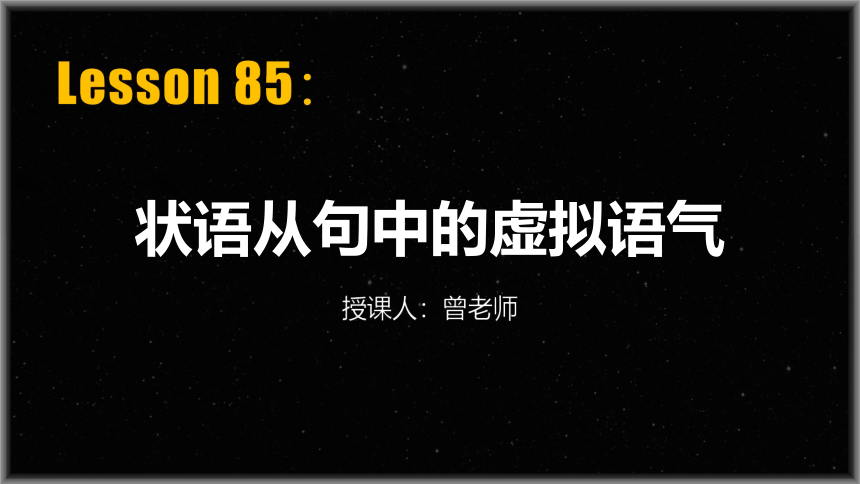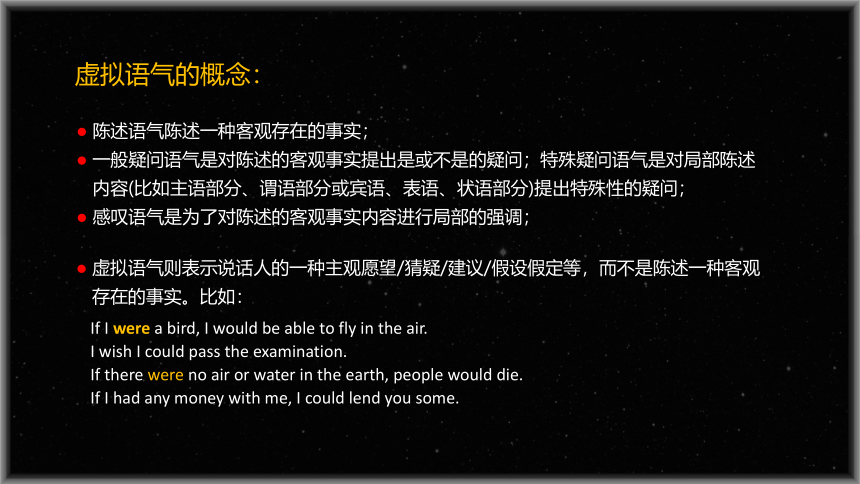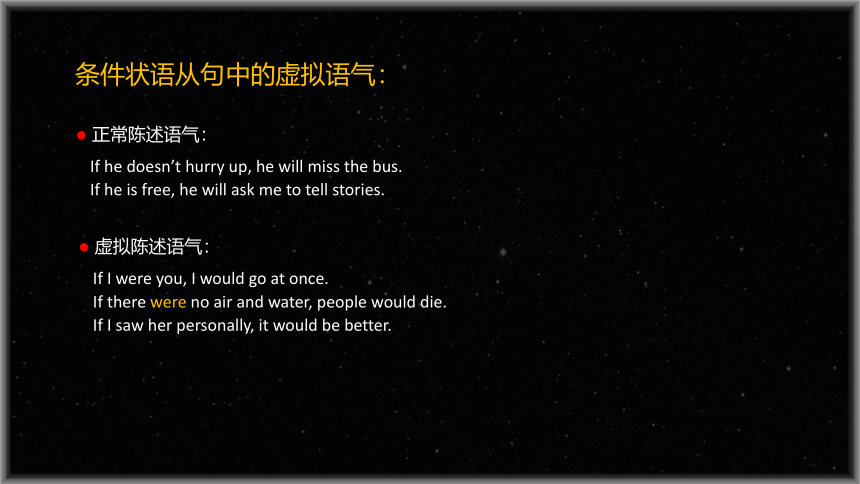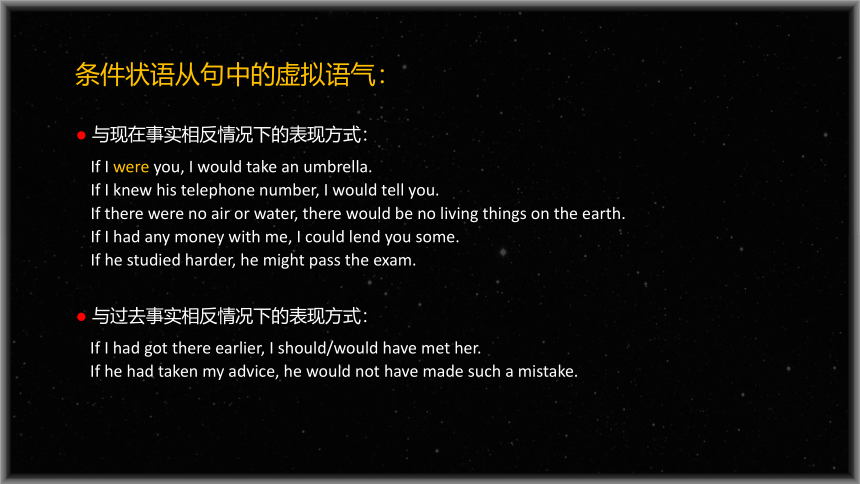L85-状从中的虚拟语气 初中英语词性句法新讲课件
文档属性
| 名称 | L85-状从中的虚拟语气 初中英语词性句法新讲课件 |  | |
| 格式 | ppt | ||
| 文件大小 | 876.0KB | ||
| 资源类型 | 试卷 | ||
| 版本资源 | 通用版 | ||
| 科目 | 英语 | ||
| 更新时间 | 2022-04-11 09:59:44 | ||
图片预览




文档简介
(共9张PPT)
状语从句中的虚拟语气
Lesson 85:
授课人:曾老师
虚拟语气的概念:
陈述语气陈述一种客观存在的事实;
一般疑问语气是对陈述的客观事实提出是或不是的疑问;特殊疑问语气是对局部陈述
内容(比如主语部分、谓语部分或宾语、表语、状语部分)提出特殊性的疑问;
感叹语气是为了对陈述的客观事实内容进行局部的强调;
If I were a bird, I would be able to fly in the air.
I wish I could pass the examination.
If there were no air or water in the earth, people would die.
If I had any money with me, I could lend you some.
虚拟语气则表示说话人的一种主观愿望/猜疑/建议/假设假定等,而不是陈述一种客观
存在的事实。比如:
条件状语从句中的虚拟语气:
正常陈述语气:
If he doesn’t hurry up, he will miss the bus.
If he is free, he will ask me to tell stories.
虚拟陈述语气:
If I were you, I would go at once.
If there were no air and water, people would die.
If I saw her personally, it would be better.
条件状语从句中的虚拟语气:
与现在事实相反情况下的表现方式:
If I were you, I would take an umbrella.
If I knew his telephone number, I would tell you.
If there were no air or water, there would be no living things on the earth.
If I had any money with me, I could lend you some.
If he studied harder, he might pass the exam.
与过去事实相反情况下的表现方式:
If I had got there earlier, I should/would have met her.
If he had taken my advice, he would not have made such a mistake.
条件状语从句中的虚拟语气:
与将来事实相反情况下的表现方式:
If he should come here tomorrow, I would talk to him.
If there were a heavy snow next Sunday, we would go skating.
If she were to be here next Monday, I would tell her about the matter.
混合式的虚拟语气:
从句的动作与过去事实相反,而主句的动作与正在发生的事实不符。比如:
If I had worked hard at school, I would be an engineer now.
If they had informed us, we would not come here now.
条件状语从句中的虚拟语气:
在书面语中,当从句的谓语动词含有were/should/had时,常使用倒装语序:
Were I Tom, I would refuse.
Were she here, she would agree with us.
Had I time, I would come.
Should he agree to go there, we would send him there.
Had he learnt about computers, we would have hired him to work here.
用介词短语去替代虚拟条件句后,引起的假定假设:
But for the storm, we should have arrived earlier. (暗含if it had not been for the storm)
But for your help, I would not have succeeded in the experiment.
Without your help, we wouldn’t have achieved so much.
Without your instruction, I would not have made such great progress.
条件状语从句中的虚拟语气:
otherwise引起的假定假设:
I was busy that day. Otherwise I would have come to help you.
We didn't know his telephone number, otherwise we would have telephoned him.
隐藏了条件句后的假定假设:
I would not have done it that way.
I would have bought the DVD player.
He would have finished it.
You should have got here earlier.
It would cause great trouble not to lubricate the bearing immediately.
I should agree with you.
You could have passed this exam.
You should have returned it to him.
You might come to join us in the discussion.
条件状语从句中的虚拟语气:
其它条件状语后引导的假定假设:
If necessary, I would send more farmhands to help you.
If repaired earlier, the tractor would not have broken down.
单独的条件句中的假定假设:
If I were at home now.
If only I had got it.
让步状语从句中的虚拟语气:
even if/even though引导的假定假设:
Even if he were here himself, he should not know what to do.
Nobody could save him even though Huatuo should come here.
状语从句中的虚拟语气
Lesson 85:
授课人:曾老师
虚拟语气的概念:
陈述语气陈述一种客观存在的事实;
一般疑问语气是对陈述的客观事实提出是或不是的疑问;特殊疑问语气是对局部陈述
内容(比如主语部分、谓语部分或宾语、表语、状语部分)提出特殊性的疑问;
感叹语气是为了对陈述的客观事实内容进行局部的强调;
If I were a bird, I would be able to fly in the air.
I wish I could pass the examination.
If there were no air or water in the earth, people would die.
If I had any money with me, I could lend you some.
虚拟语气则表示说话人的一种主观愿望/猜疑/建议/假设假定等,而不是陈述一种客观
存在的事实。比如:
条件状语从句中的虚拟语气:
正常陈述语气:
If he doesn’t hurry up, he will miss the bus.
If he is free, he will ask me to tell stories.
虚拟陈述语气:
If I were you, I would go at once.
If there were no air and water, people would die.
If I saw her personally, it would be better.
条件状语从句中的虚拟语气:
与现在事实相反情况下的表现方式:
If I were you, I would take an umbrella.
If I knew his telephone number, I would tell you.
If there were no air or water, there would be no living things on the earth.
If I had any money with me, I could lend you some.
If he studied harder, he might pass the exam.
与过去事实相反情况下的表现方式:
If I had got there earlier, I should/would have met her.
If he had taken my advice, he would not have made such a mistake.
条件状语从句中的虚拟语气:
与将来事实相反情况下的表现方式:
If he should come here tomorrow, I would talk to him.
If there were a heavy snow next Sunday, we would go skating.
If she were to be here next Monday, I would tell her about the matter.
混合式的虚拟语气:
从句的动作与过去事实相反,而主句的动作与正在发生的事实不符。比如:
If I had worked hard at school, I would be an engineer now.
If they had informed us, we would not come here now.
条件状语从句中的虚拟语气:
在书面语中,当从句的谓语动词含有were/should/had时,常使用倒装语序:
Were I Tom, I would refuse.
Were she here, she would agree with us.
Had I time, I would come.
Should he agree to go there, we would send him there.
Had he learnt about computers, we would have hired him to work here.
用介词短语去替代虚拟条件句后,引起的假定假设:
But for the storm, we should have arrived earlier. (暗含if it had not been for the storm)
But for your help, I would not have succeeded in the experiment.
Without your help, we wouldn’t have achieved so much.
Without your instruction, I would not have made such great progress.
条件状语从句中的虚拟语气:
otherwise引起的假定假设:
I was busy that day. Otherwise I would have come to help you.
We didn't know his telephone number, otherwise we would have telephoned him.
隐藏了条件句后的假定假设:
I would not have done it that way.
I would have bought the DVD player.
He would have finished it.
You should have got here earlier.
It would cause great trouble not to lubricate the bearing immediately.
I should agree with you.
You could have passed this exam.
You should have returned it to him.
You might come to join us in the discussion.
条件状语从句中的虚拟语气:
其它条件状语后引导的假定假设:
If necessary, I would send more farmhands to help you.
If repaired earlier, the tractor would not have broken down.
单独的条件句中的假定假设:
If I were at home now.
If only I had got it.
让步状语从句中的虚拟语气:
even if/even though引导的假定假设:
Even if he were here himself, he should not know what to do.
Nobody could save him even though Huatuo should come here.
同课章节目录
- 词法
- 名词
- 动词和动词短语
- 动词语态
- 动词时态
- 助动词和情态动词
- 非谓语动词
- 冠词
- 代词
- 数词和量词
- 形容词副词及其比较等级
- 介词和介词短语
- 连词和感叹词
- 构词法
- 相似、相近词比较
- 句法
- 陈述句
- 一般疑问句和否定疑问句
- 特殊疑问句及选择疑问句
- 反意疑问句
- 存在句(There be句型)
- 宾语从句
- 定语从句
- 状语从句
- 主谓一致问题
- 简单句
- 并列句
- 复合句
- 主谓一致
- 主、表语从句
- 名词性从句
- 直接引语和间接引语
- 虚拟语气
- 感叹句
- 强调句
- 倒装句
- 祈使句
- 句子的成分
- 句子的分类
- 题型专区
- 单项选择部分
- 易错题
- 完形填空
- 阅读理解
- 词汇练习
- 听说训练
- 句型转换
- 补全对话
- 短文改错
- 翻译
- 书面表达
- 任务型阅读
- 语法填空
- 其他资料
